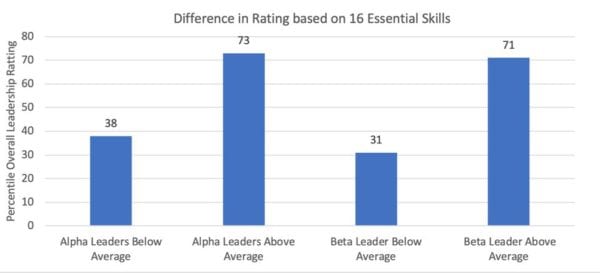Leaders Under Pressure: Finding The Essential Skills For The New Era

If your boss thinks you’re awesome, you will become more awesome

6 top behaviors that cause a loss of trust

The business boss is stressing out about the business dealings while chatting at the computer tablet. A businessman stressing over about work on a tablet computer in the office.

The Hertz Corporation, Neiman Marcus, Frontier Communications, McDermott International, and JC Penney are just a few large corporations that have filed for Bankruptcy in 2020. According to recent data, this list of bankruptcies will continue to grow larger than we have ever seen before. The pandemic has impacted, mostly in a significant and negative way, nearly every employee and leader worldwide. Work is forced to be done in different ways. Employees have developed heightened anxiety and concerns about their future.
Are we powerless in our circumstances? Is there something leaders can do to soldier on through these difficult times? Are there certain skills that can even make a difference in a Pandemic?
As my colleague Jack Zenger and I searched for what exactly is required in these new circumstances, we realized we had some very unique data. We could look at our database of 360-degree assessments and see if there were any significant changes in the way direct reports scored their leaders after the pandemic hit. Were there certain traits that were now more important? We weren’t sure if we would find anything significant or if the reports would be the same. What we learned from these leaders was regardless of culture, industry, or position, there are traits that we cling to in times of need.
A group we will call Alpha was a senior management team. We appreciated this data because senior leaders have had the responsibility to make a significant number of difficult decisions during the pandemic. The other group we call Beta was 1,276 leaders. These leaders have been forced to work in different ways and address challenges. About 50% of these leaders were from the US, the remainder were scattered across the globe. Leaders in this group came from a variety of different organizations, levels, and functions. To analyze the data, we separated those leaders who scored above average on the 60 items of a multi-rater or (360-degree assessment) compared to those scoring below average.
As we looked at all the reports, we began to see that regardless of the organizations or locations, we see the same behaviors popping up and being scored entirely differently. We discovered a consistent set of 11 behaviors that differentiated high scorers and below-average scorers in both Alpha and Beta. In addition, we observed that five items were showing larger differences within the Alpha or senior executive group than in the Beta group.
Further analysis of these 16 behaviors confirmed that leaders who scored above average had a significant positive impact on their overall effectiveness. (For Alpha leaders T Value = 5.80, Sig = 0.000, for the Beta leaders T Value = 54.28, Sig = 0.000.) These 16 behaviors were deemed essential skills that enabled leaders to be more successful in the pandemic.
The graph below shows the impressive difference these 16 behaviors made in how individuals were perceived on their overall leadership effectiveness. Looking at our extensive database of 360-degree assessments, we modeled the impact of high and low performance in these areas.

Five Skills That Make The Biggest Difference
While many leadership skills have maintained their importance regardless of the situation, we were curious to learn which behaviors have become more critical in this pandemic. The data revealed five behaviors that moved up in importance. This suggests that respondents put more weight on these issues today than in the past. These five are:
- Balancing getting results with a concern for the individual needs of people.Pre-pandemic our belief is that the balance was 60% results 40% individual needs. The desired pandemic balance needs to be 40% results, 60% individual needs. Many employees are anxious, stressed, and unsure about their future. They need a leader who cares about them.
- Cooperation from people in other parts of the organization.With increases in remote work, the need for cooperation across groups had substantially increased.
- Conveying a high level of energy and enthusiasm.Uncertainty creates anxiety for employees, and they are desperate to hear a positive and enthusiastic voice.
- Helping others understand the organization’s vision. For most organizations, the pandemic has required a shift in the strategy and direction. Employees working remotely also need greater clarity about their goals.
- Quickly recognizing where change is needed.The pandemic has required many significant shifts in how work was done, priorities and goals. No doubt, there will be a need for additional change in the future.
The Power In Learning From Each Other
Consider this article a small look at what leaders are doing or not doing right now that is making a significant difference. One of the biggest lessons I learned from these 360-degree assessments was the large emphasis on balancing results with other’s needs. It ranked number one for a reason. People need their leaders to understand the challenges they’re facing with compassion and be able to guide them back to solid ground.
Leaders we have been working with since the start of the pandemic have been very appreciative of having an accurate and reliable assessment of their essential skills. Especially now, our own intuition about our performance may be far from accurate. With more employees and managers working remotely, it has become even more difficult for leaders to understand their performance.
Will you take on an assignment based on the five most essential skills for a pandemic? I encourage you to gather feedback on the following questions from your manager, peers, direct reports, and others.
- Do I balance getting results with a concern for the individual needs of people? How can I improve?
- Have I enabled there to be cooperation from people in other parts of the organization? How can I adapt my work to involve others more?
- How is my energy and attitude affecting others? Do I convey a high level of energy and enthusiasm?
- Have I been helping others understand the organization’s visionand strategy?
- Have I been able to quickly recognize and respond where change is needed? How could I improve?
Remember, once someone gives you feedback, thank them for the gift and then act on that feedback. With a little bit of insight in the right direction, you can become the leader needed for this new era.
Source : zengerfolkman.com



